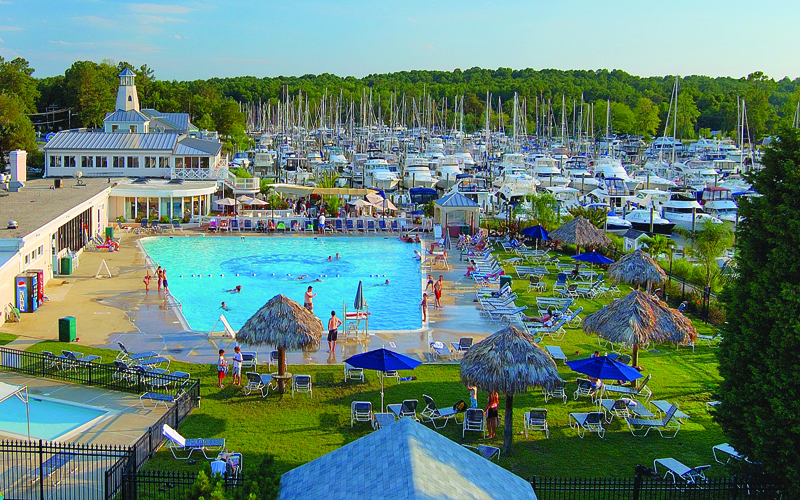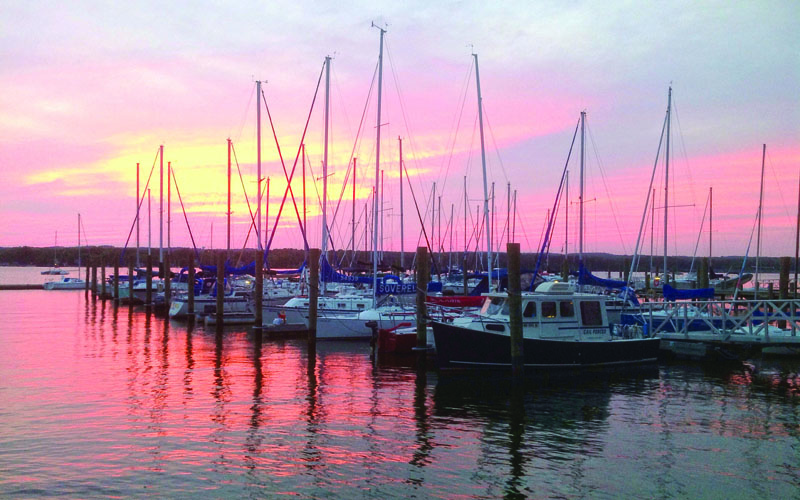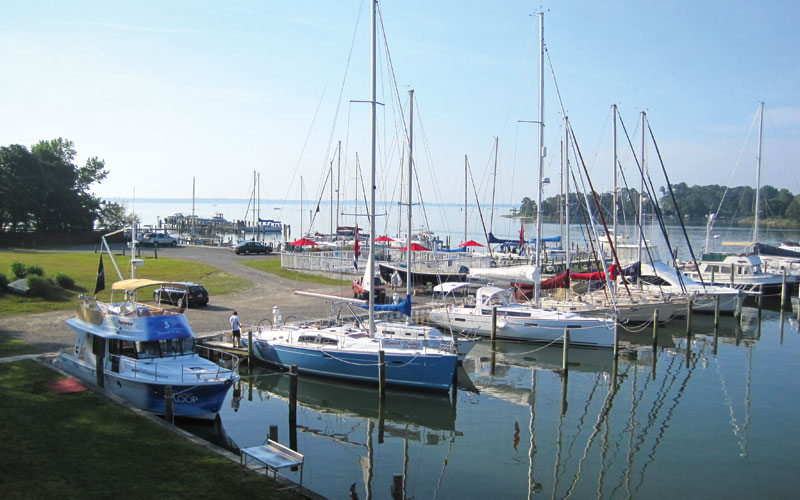What You Want Out of Your Marina Depends on What You Want Out of Your Boating
Looking for a marina on the Chesapeake Bay? If so, you’ve probably already discovered that it isn’t always easy to find one that suits your needs. Just as you learned when you bought your boat, there are a lot of factors to consider, and you may end up facing some troublesome tradeoffs.
A marina that provides basic slip-space may fall short on the amenities that your family wants. On the other hand, do you really want to pay for a swimming pool and clubhouse if all you’re planning to do is go fishing with your buddies? Will tying up at a remote pier mean that you pay a travel fee for a mechanic to get there? Questions like these are worth exploring.
“Choosing a marina is a lot like buying a house,” says Wendy Kravit, an Annapolis boater who has spent time selecting marinas for sailboats and powerboats that she’s owned over the years. “You not only have to be sure the slip is right for your particular boat, you have to check out the neighborhood and look into the security. It’s easier to find a boat than to find a marina.” Here are some factors you may want to consider.

What’s your boat like, and how do you plan to use it?
If you have a sailboat with a deep draft — or an extra-beamy cabin cruiser —make sure that both the channel leading up to the marina and the fairways between the rows of slips are big enough to let you get in and out easily, even on windy days. Is the approach channel deep and well-marked, with lighted buoys? Could you find your way in after dark?
How far is the marina from your home? If you plan to go out every weekend, a two-hour drive can quickly become a drag. How long will it take for your boat to motor from your slip to the area where you usually do your boating? If you like to get out to the Bay quickly, you won’t want a marina that’s several miles upriver.
What services and amenities will you need, or want, and how much will they cost?
Does the marina provide shore-power hookups? Fresh and drinkable water that you can use to fill your boat’s water tanks? How about the following: finger piers, well-placed cleats and line-hangers, dock carts, gear boxes, dinghy storage, and adequate parking for you, your crew, and guests?
Are there heads and showers ashore, a swimming pool, picnic tables, and a restaurant or clubhouse? Depending upon the characteristics of your boat — and the needs of your crew and family — the answers to these questions could be important.

Visit the marina and take a close look around.
Is the marina in a spot that’s well-protected in case of a storm or hurricane? How high has the water risen in big storms — above the piers and pilings? Does the marina offer dry storage? Is there a boatyard onsite? How good is it? Does the marina operate head-pumpout facilities? Does it provide the fuel you need? If not, how far must you travel for these services?
Are the piers and walkways in good condition, without loose planks or wobbles? Is the marina neat, clean, and well-cared-for? Are the walkways lighted at night? Is there adequate security? Has the marina placed safety ladders every few slips so you can climb out easily if you fall into the water (it does happen…)? Does it have a boat-ramp? A travel-lift for haulouts?
Will you have enough room to dock your boat comfortably? If your slip is too short, your bow will stick out into the fairway, causing problems for other boats; or you may not be able to cross your sternlines. Is the fairway between the rows of slips wide enough for you to maneuver? If you’re considering a seawall slip, is the silt piled so high you may run aground?
Look around at the makeup of the marina’s tenants. Would your vessel be the only sailboat in the mix? If it is, would being the odd-boat-out present any problems? Are the boats currently tied up there in good condition? Is the marina manager present and available?
After you’ve talked with the marina’s manager, visit the place on a nice weekend morning and talk to other boaters to get their take on many of these key issues. Ask them if they’ve encountered any downsides to keeping their boats there. Check out the slip you want to lease and see how it looks from ashore.

Do the marina personnel seem helpful and responsible? What can you expect them to do for you? Notify you if your vessel has been disturbed or burglarized? Double up your lines in case of a storm? How can you reach one of the marina’s managers if you run into an emergency or serious problem after hours? Who provides security protection? Is the marina gated?
Know the rules.
Marinas often have all sorts of rules, some that you may welcome and some that may prove difficult. Are there restrictions on the hours you can enter the marina? On the amount of noise that slipholders and their guests can make? On living onboard your boat? On attaching your own cleats, hooks, or other hardware to piers, wharves, or pilings? Some marinas, particularly those that maintain onsite boatyards, prohibit outside mechanics and other personnel from working on your boat while it’s on shore. Will that pose a problem for you? What are your obligations if your boat leaks fuel or oil? If you decided to leave before your contract ended, could you sublet your slip? If not, what would happen?
Before you sign, try it out — by boat.
Motor to the marina to see for yourself what the approach channel is like and how difficult it is to get to your slip. If possible, with the permission of the marina’s manager, try docking your boat in the slip you’d like to lease (or a similar one). Go in and out several times to be sure you haven’t missed anything.
Compare prices and benefits.
Depending on the market, some marinas may be willing to give you a break on slip fees, particularly if they have a lot of unfilled spaces. Or you may find that you don’t need some of the amenities and can get by well enough somewhere else. Re-check what you’ll be paying for and decide whether it’s what you want.
Read the contract closely.
Make sure that you’ve looked over all the restrictions, obligations, and other rules and that you’re prepared to go along with them.
If you’re planning a trip and you’ll only need short-term transient space at a marina along the way, do some homework by reading cruising guides, surfing the internet, and consulting your chartplotter. Then call the marina in advance and ask questions about the issues that are important to you.
Which channel does the marina staff monitor on VHF-FM marine radio — 16, 9, or something else? What phone number is best to use in reaching them? What hours are they there to take calls? Do you need to reserve a slip ahead of time? If so, how late can you cancel it if you can’t get there in time?
Take stock of your situation every few years.
Weigh the advantages and disadvantages of where you’re keeping your boat against what you want to get from boating. You may find that your current marina still fits the bill. Or you may decide that so much about your boating has changed for you that it’s time to move. If so, dig out this article and start again.
About the author: Art Pine is a Coast-Guard-licensed captain and a longtime sailor and powerboater on the Chesapeake Bay.




